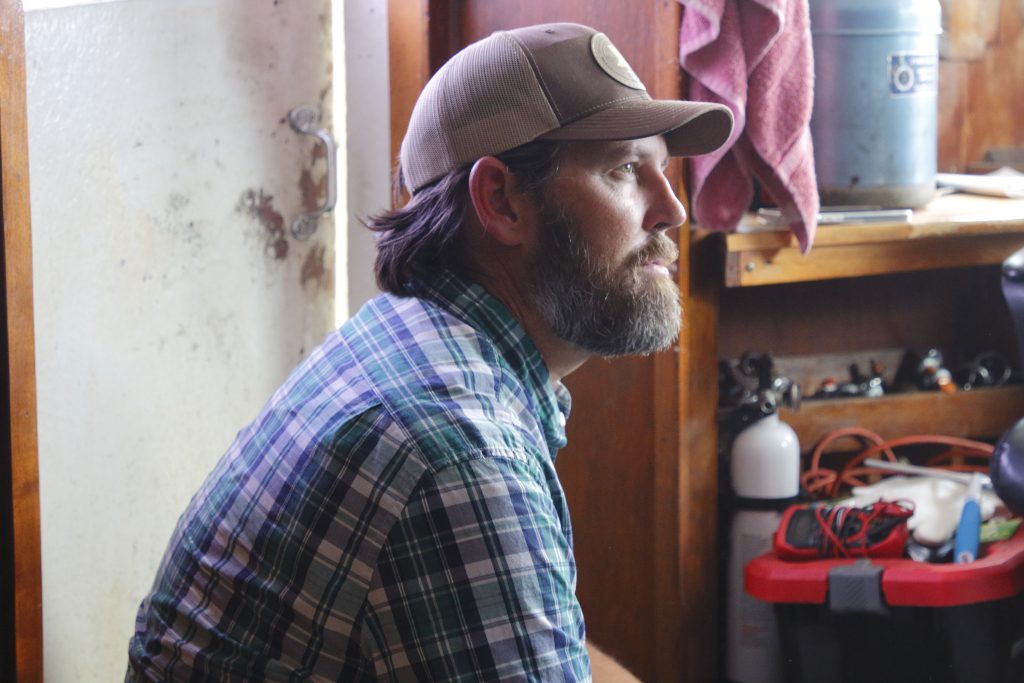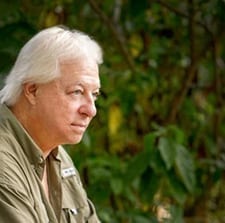Wake Up Call Aboard The Pamela Sue
September 5, 2024By Tom Poland
Shrimping Down McClellanville Way
I got up at 4:30 a.m. to go to two Carolina bays in the Francis Marion National Forest. Hours later I left pitcher plants, blue irises, and Halloween pennant dragonflies and headed to the McClellanville Diner for a platter of fresh-caught domestic shrimp. Consumers take note: it was not frozen, imported shrimp.
After lunch I went into McClellanville, a lovely fishing village that’s home to South Carolina’s largest fleet of shrimp boats. As I made my way into McClellanville I passed T.W. Graham & Co., another great local restaurant. Hand-painted on its windows were “Support # Freshlocal” and “God Bless Our Shrimpers.”

Capt. Bryan Jones of the Pamela Sue.
Carolina Seafood sits on Jeremy Creek, a creek named after King Jeremy, a Seewee Indian chief whose tribe lived along the creek’s banks. There I met Capt. Bryan Jones. He catches shrimp, no easy task. Besides the hard and dangerous work, he must overcome many a challenge. Capt. Jones showed me around his boat, Pamela Sue. Making our way through and past an assemblage of ropes, pulleys, nets, chains, and cables I filed a mental note. “Never bring a tripod onto a shrimp boat’s deck.” The chance of snagging something dangerous is great.
Capt. Jones and I sat in the wheelhouse of his 1958 boat. As he discussed shrimping’s challenges, I looked around. I noticed bunk beds right away. Shrimpers sleep in their floating office, their home away from home. I saw too a small galley and a handsome wooden wheel caught my eye. And something else. An array of sophisticated electronics that navigate and portray bottom conditions and more.
As Capt. Jones went over the troubles besetting shrimpers, it hit me hard just how much we need our shrimpers. Those of us who love fried shrimp and Beaufort stew or Lowcountry boil, as some call it, know that fresh shrimp outclass frozen shrimp, and they’re better for us. Consider fresh domestic shrimp a health supplement. According to the Associated Press “India’s rice paddies and natural mangroves are being rapidly transformed into shrimp farms teeming with wriggling shellfish and muddied with a poisonous slurry of chemicals, sewage and toxic algae.” Consumers, you best know where your shrimp come from.
For sure Capt. Bryan Jones and his fellow shrimpers face hurdles. Burdensome regulations. Rising costs, especially diesel fuel. Insurance coverage. Weather. A few days earlier, high winds from a tropical storm kept shrimpers tied up. Another headache comes from sharks tearing holes in nets. It’s so bad the shrimpers were tied up. Shrimper Richie Billington told me, “Right now, no boats are out. Sharks have gone crazy. They’re destroying our nets.”
I have long loved seeing shrimp boats at sunrise. Many a photographer has risen before dawn to silhouette picturesque trawlers against a rising sun. It’s one of the more memorable Lowcountry scenes. These days, however, it’s a rare sight. The graying of the fleet is one reason. The sheer difficulty of making a living due in large part to imported shrimp is a major reason. And now an Alaskan Congresswoman has introduced legislation to create permanent no trawling zones in sensitive environments in Alaska, but the wording applies to trawlers along the Southeast coast. Nets cost a pretty penny and Capt. Bryan Jones told me, “No shrimper will put his nets where structures rip holes in them.”
It’s encouraging to see young men like Capt. Bryan Jones trawling for shrimp. He’s knowledgeable, energetic, and determined. In an age when the graying of the fleet and other issues plague shrimping, they plague consumers as well. Do your part to help. Know where your shrimp come from. And give thanks for our brave shrimpers.
Georgia native Tom Poland writes a weekly column about the South, its people, traditions, lifestyle, and culture and speaks frequently to groups in the South. Governor Henry McMaster conferred the Order of the Palmetto upon Tom, South Carolina’s highest civilian honor, stating, “His work is exceptional to the state.” Poland’s work appears in books, magazines, journals, and newspapers throughout the South.
Visit Tom’s website at www.tompoland.net
Email him at [email protected]






















